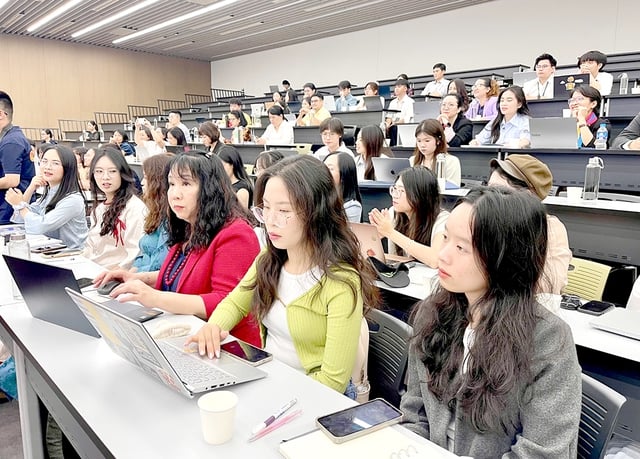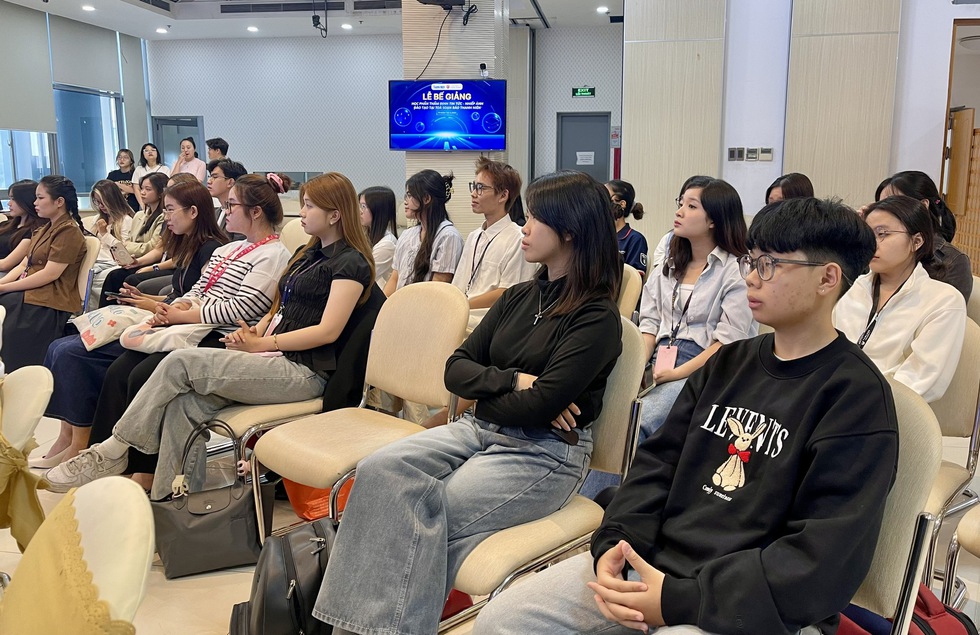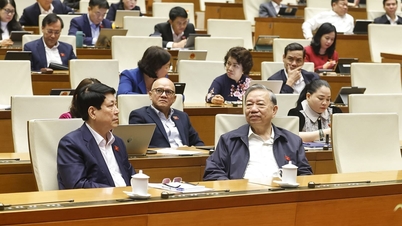That is the prediction made in the World Economic Forum's Future of Jobs Report published earlier this year.
N FASTEST GROWING JOBS
The report is based on a survey of more than 1,000 employers representing more than 14 million workers in 22 industry clusters and 55 economies around the world . The report clearly reflects the impact of trends on employment and skills leading to changes in the global and regional labor markets in the period from 2025 to 2030.

Students need to equip themselves with lifelong learning skills, a factor that gives workers a competitive advantage in the workplace.
PHOTO: MY QUYEN
The report said that 170 million jobs will be created in the coming period, while 92 million jobs will be displaced. This means a net gain of about 78 million jobs.
The fastest-declining jobs are in the administrative sector, such as cashiers and ticket clerks, administrative assistants, executive secretaries, printers, accountants and auditors, as artificial intelligence (AI) and information processing technologies, robots and automated systems can replace them.
Meanwhile, the fastest-growing tech-related jobs include big data specialists, financial technology engineers, AI and machine learning specialists, software and application developers, as well as green energy transition jobs such as electric and autonomous vehicle specialists, environmental engineers, and renewable energy engineers.
Trends in AI and information processing technology are expected to create 11 million jobs and displace 9 million more than any other technology trend. Robots and automated systems are expected to be the biggest net job displacement driver, with a net loss of 5 million jobs.
Among the positions expected to see the biggest growth in employment is farmworkers. Green transformation trends, including efforts to reduce carbon emissions and adapt to the climate crisis, will drive growth, creating 34 million additional jobs by 2030, adding to the 200 million farmworkers currently employed.
Next are delivery drivers, construction workers, sales clerks and food processors. Jobs such as nursing professionals, social workers, counselors and personal care assistants, high school teachers and university lecturers will also see strong growth.
The Future of Jobs report indicates that currently 47% of jobs are done primarily by humans, 22% are done primarily by technology (machines and algorithms), and 30% are completed by a combination of both.

Analytical thinking is the top core skill sought by employers.
Photo: My Quyen
NEW SKILLS REQUIRED BY EMPLOYERS
Based on these changes, the World Economic Forum has found that businesses require candidates to have more experience and skills. Analytical thinking remains the top core skill most sought after by employers, with 7 out of 10 companies considering it an essential skill.
Next are resilience, flexibility and agility, along with leadership and social influence; adaptability and collaboration along with cognitive skills. Creative thinking and motivation, self-awareness ranked fourth and fifth respectively.
In particular, AI and big data top the list of fastest growing skills, closely followed by networking and cybersecurity, and technology literacy. Complementing these technology-related skills are creative thinking, resilience, flexibility and agility, along with curiosity and lifelong learning, which are also predicted to continue to grow in importance over the 2025-2030 period. These skills will become core to helping candidates gain a competitive advantage.
Compared to the Future of Jobs Report 2023, this year's report shows a number of new core skills such as leadership and social influence, AI and big data, talent management, service orientation and customer service. Conversely, manual dexterity, endurance and precision have decreased in importance.
The most prominent skills that distinguish growing jobs from declining ones include resilience, flexibility and agility; resource management and operations; quality control; programming and technological literacy.
The report found that 70% of employers expect to hire employees with new skills, 40% plan to lay off staff as their skills become less relevant, and 50% plan to transition employees from declining to evolving roles.
Employers headquartered in the ASEAN region are particularly focused on upskilling their workforce (96%, compared to 85% globally) and recruiting employees with new skills (86%, compared to 70% globally).
With these changing skills demands, the scale of the need to upskill and reskill the workforce remains significant: if the world's workforce consists of 100 people, 59 will need training by 2030.
Half of employers plan to reorient their business to adapt to AI, two-thirds plan to recruit talent with specific AI skills, while 40% predict they will reduce their workforce as AI can automate tasks. (continued)
Advice for students
Ms. Nguyen Bich Van, Head of Human Resources at Navigos Group, commented that AI is exploding and profoundly changing the labor market. "We are living in an era where everything changes faster. Technology, especially AI, is creating strong changes in almost every industry. Many familiar jobs are gradually being replaced, while countless new jobs appear. In that context, students in particular and workers in general cannot just learn to know but need to learn to do, learn to adapt and learn to develop sustainably," Ms. Van said.
According to Ms. Van, students of any major need to have a basic technology foundation: understanding data, knowing how to use digital tools and having a digital mindset. They need to know how to work with AI and understand the limits, risks and ethics of using AI.
"Lifelong learning is considered a vital factor, helping workers gain a competitive advantage in their careers. Technology and knowledge are constantly updated, and a growth mindset will be the guiding principle to help students identify their weaknesses and shortcomings as well as future skills to self-study from all platforms. Practicing the skills of asking questions, debating arguments, analyzing data and creatively solving problems will always be a great support for the right decision-making process," Ms. Van noted.
In addition, the ability to use foreign languages fluently, communication skills, specifically presentation, listening, and conveying ideas clearly will help students become connecting factors in any organization. In particular, Ms. Van believes that every student should have a "start-up" mindset early. It is not necessarily about establishing a company but also daring to proactively lead one's career journey, always ready to change, constantly learn, master skills and create value for oneself in any situation to find the right direction in an ever-changing world.
Source: https://thanhnien.vn/ky-nang-nguoi-lao-dong-can-trang-bi-thoi-ai-185250430190034224.htm





![[Photo] 60th Anniversary of the Founding of the Vietnam Association of Photographic Artists](/_next/image?url=https%3A%2F%2Fvphoto.vietnam.vn%2Fthumb%2F1200x675%2Fvietnam%2Fresource%2FIMAGE%2F2025%2F12%2F05%2F1764935864512_a1-bnd-0841-9740-jpg.webp&w=3840&q=75)
![[Photo] National Assembly Chairman Tran Thanh Man attends the VinFuture 2025 Award Ceremony](/_next/image?url=https%3A%2F%2Fvphoto.vietnam.vn%2Fthumb%2F1200x675%2Fvietnam%2Fresource%2FIMAGE%2F2025%2F12%2F05%2F1764951162416_2628509768338816493-6995-jpg.webp&w=3840&q=75)































































































Comment (0)